- Home
- Donald Hamilton
The Intimidators Page 2
The Intimidators Read online
Page 2
“Sure. And if my mother was alive, you’d use her, too.”
It was a rough game we played after years of association. He’d started it; now he ended it by saying: “The British Colonial Hotel, Eric. I’ve told you how and when to get in touch with our local people. Minsk arrives the day after tomorrow, according to our information, which may or may not be correct. You can use the time to familiarize yourself with the city. I don’t believe you’ve been there. And remember, we want no international incidents. Discretion is mandatory.”
“Yes, sir. Mandatory. Question, sir.”
“Yes, Eric?”
“Do I stop him or don’t I?”
“What do you mean?”
“You know what I mean, sir,” I said. There are times, even when dealing with Mac, that you’ve got to remember that bureaucrats are bureaucrats the world over, and you’ve got to pin them down. “Do I do my job before or after he does his?”
“You’re assuming that he’s coming to the Bahamas on official business?”
“The record says he never sticks his nose out of his Muscovite sanctuary for anything else.”
Mac hesitated. Then he said, “I think it would be nice, on general principles, if Mr. Minsk’s last job should be a failure. However, it is not of critical importance. Fortunately, we have no instructions to cover the point; and we are not a fine, humanitarian organization like the Salvation Army. I’ll leave the matter to your judgment, Eric.”
“Yes, sir.”
After hanging up, I realized that I’d forgotten something I’d meant to ask him. Earlier, I’d requested a check on William J. Haseltine, the Texas tycoon who’d been so anxious for me to go fishing at Walker’s Cay. I mean, it’s a nasty suspicious racket in a nasty suspicious world; and when a friendly person hands you a candy bar out of the goodness of his heart, your first act, if you’ve been properly trained, is to check it for cyanide. Big Bill might be exactly what he’d seemed, a wealthy Tejano who liked to pay his debts, but then again he might not. Well, if our research people had turned up anything interesting, Mac would have told me.
Or maybe not. It occurred to me that it was kind of coincidental, my being handy in the Bahamas, where I’d never been before, at just the time Mr. Pavel Minsk decided to pay a visit to Nassau, or somebody decided it for him. I don’t have a great deal of faith in coincidences like that. I warned myself that I’d better watch my step even more carefully than I normally would, dealing with a high-ranking fellow-pro, since it was possible that big mysterious things were afoot in that foreign island area just off the Florida coast; and that brilliant executive characters in Washington and elsewhere were surreptitiously shifting people like the Mink and me into striking position, like pieces on a chessboard.
At this stage of the game, if it was a game, everybody would be feeling very clever indeed, initiating supposedly infallible undercover gambits with sublime confidence. A little later, after a few unexpected reverses on both sides, everything would fall into hopeless confusion, and it would be up to the remaining pawns and pieces on the board to figure out what was supposed to be going on, and play out the contest on their own, judiciously disregarding panicky directives fired at them by rattled superiors totally out of touch with the situation in comfortable offices thousands of miles away.
I don’t mean to imply that Mac ever gets seriously rattled. He’s not that human. As far as I know, he never gets rattled at all. However, there are always political hacks in the upper hierarchy who have to change into rubber training-pants whenever the international going gets rough, meanwhile stammering out frantic, incoherent orders that Mac is obliged to transmit.
I was early for my seven o’clock dinner engagement, deliberately. I’d been given no indication who Mr. Jonas Starkweather was or what he looked like, and nobody’d arranged for us to wear white carnations in our buttonholes. Since I didn’t know whom I was looking for, and he presumably did, I wandered into the cocktail lounge adjacent to the dining room fifteen minutes ahead of time, ordered a martini, and sat at a window looking down at the beach seven stories below, and the blue Atlantic Ocean, and the boats.
The funny thing was, I reflected a bit grimly, that I was supposed to be kind of an expert on boats these days, having stumbled through a few assignments involving watercraft of one kind or another—generally with lots of help from real sailors who happened, luckily for me, to be involved. Actually, I’d been born in the approximate center of the continent and hadn’t been formally introduced to salt water until, early in my present career, I was run through a quickie training course at Annapolis designed for agents who might have to know a little about getting on and off a foreign shore.
However, you get typed very quickly in this business just as in any other. Do a good job once or twice with high explosives or a submachine gun and you suddenly discover that you’re the resident big-bang or chopper expert. I had a hunch that, since my last watery assignment had turned out pretty well, I’d kind of automatically become Mac’s nautical specialist, the man to be called upon whenever action afloat could be expected; and that this was at least one reason why I’d been picked for this job in the Bahamas, which are mostly water. It wasn’t a reassuring thought, and I decided that if I had time in the morning before catching my plane to Nassau, I’d better hunt up a bookstore and get myself a copy of a large volume entitled Chapman’s Piloting, Seamanship, and Small Boat Handling which, I’d been told, is the basic reference work for all aspiring small-boat sailors…
“Matt! It’s been a long time!”
I looked around quickly. Two men stood above me. The one I didn’t know was the one who’d spoken: a tall, thin, stooped individual with hornrimmed glasses, obviously—maybe a little too obviously—an editor bent by years of labor at desks full of manuscripts. Actually, he was probably a good man with a gun, at least a fair hand with a knife, and maybe even something of a judo or karate expert. The tweedy, intellectual look was, however, quite convincingly done. I got up and stuck out my hand.
“Jonas!” I said. “My favorite skinflint editor! What’s got you buying dinner for indigent photographers?”
The man going by the name of Starkweather, for the moment, grinned. “To be perfectly honest, it wasn’t my idea. I came down to arrange to do a piece on Bill Haseltine, here, and he said he’d just run into you down in the Keys, and you’d seemed like the kind of man he could work with.” While I shook hands with Haseltine, Starkweather went on: “I don’t know how much you know about this guy, Matt, but he’s a great yachtsman and fisherman; and he just set a world’s record for tarpon in the new six-pound-line class. He’s got several other big-game fishing records on the books. Outdoors wants to do a story on him in action with a lot of color stuff… Well, let’s find our table and get some drinks in our hands. Bring yours along, Matt.” He ushered us toward the nearby dining room, still talking: “I don’t think a tarpon is quite the fish we want for the piece, too close to shore; and tuna don’t jump worth a damn. There aren’t many of either available right now, anyway. Sailfish and white marlin don’t run big enough as a rule, although either will do in a pinch; but a big blue marlin would be better if Bill can get one on and keep it there long enough for you to get the pictures. Let’s say that, for our purposes, Bill is now trying for the world’s record blue marlin on six-pound line. Of course, if it’s anywhere near normal size for these parts, it will probably break that silly little thread and get away, but we can make that the point of the story, showing that the problem of setting big-fish records with this ultra-light tackle is really a matter of finding one small enough to handle.” He was talking loudly enough that if anybody around didn’t know the subject of the conversation, he just wasn’t listening. Now Starkweather glanced at his watch and went on: “The trouble is, I’ve got a plane to catch; I can only stay a few minutes longer. Sorry, Matt, this just came up; dinner’s on me, anyway. I thought if I brought the two of you together you could work it out between you. You’ll need a good-looking fish
ing boat for as long as it takes, and maybe a chase boat for a day or two, but don’t break the bank, please…”
It was quite a performance. He left ten minutes later without having stopped talking once. For some moments of silence, Haseltine and I each drew a long breath of relief, simultaneously, and grinned at each other.
“Well, how did you make out at Walker’s?” Haseltine asked.
“Never mind that,” I said. “We can talk about fish later.”
“Sure.” Haseltine hesitated and spoke softly. “What do you know about the Bermuda Triangle, Helm?” he asked.
3
There are two kinds of rich Texans, the lanky cowboy type that made it with cattle, and the chunky truck-driver type that made it with oil. Scientifically speaking, the varieties are not distinct. There’s been a certain amount of interbreeding, and you will occasionally find a lean Gary Cooper specimen with a pasture full of oil wells, or a massive gent with the build of a wrestler and a pasture full of cows—the pasture, in each case, being approximately the size of Rhode Island.
The Haseltine stock, however, had apparently bred true ever since the first recorded beefy roughneck of that name brought in his first wildcat gusher and named it the Lulu-belle #1 or whatever his wife’s name—or current girl friend’s—happened to be. If I sound a little snide it’s because, although born elsewhere, I was brought up in New Mexico, a proud but impoverished state that tends to look askance at the antics of its gigantic, wealthy neighbor and the drawling, well-heeled citizens it exports in overpowering numbers. Call it jealousy if you like.
Big Bill Haseltine was at least six feet tall and weighed around two hundred and fifty pounds, not much of it fat. He had the smooth brown tan of a man who’s taken pains to get a smooth brown tan; an altogether different complexion from the leathery, squinty look of the man who’s actually been obliged to work outdoors and accept whatever the sun and wind dished out He had wide Indian cheekbones and thick, straight, coarse black Indian hair that retained the marks of the comb. His eyes were brown. They were friendly enough at the moment, but I didn’t trust them to stay that way if the man ever got drunk, or thought that he’d been double-crossed, or that somebody hadn’t treated him with the respect due the name of Haseltine.
I decided that if I ever had to take him, I’d better start when he wasn’t looking and use a club. He was too big and in too good condition for me to worry about trifles like fair and unfair.
“Sorry,” I said. “I was always lousy at geometry. The only triangle I can remember was called isosceles.”
“It’s sometimes known as the Bahama Triangle,” Haseltine said. “It’s also been called the Atlantic Twilight Zone, the Devil’s Triangle, the Triangle of Death, and the Sea of Missing Ships. It’s supposed to be haunted by sudden whirlpools large enough to suck down good-sized freighters and tankers, or immense sea monsters with hearty appetites for sailors and airplane pilots, or freak windstorms capable of totally disintegrating ships and planes, or very hostile unidentified flying objects equipped with real efficient vanishing rays. Take your choice.”
“Just what are the boundaries of this lethal area?” I asked.
“Well, you were right out in it, at Walker’s Cay,” said the sunburned man facing me. “It kind of depends who’s doing the survey, but generally speaking the line’s supposed to run from a point somewhere up the U.S. coast, out east to Bermuda, down southwest to a point somewhere in the neighborhood of Puerto Rico, say, and back up along Cuba and Florida to the starting point. Some writers have put the eastern corner as far off as the Azores, and the southern one way down near Tobago, but that’s stretching it a bit.”
“That’s a lot of water, regardless,” I said thoughtfully. “If I’ve got the picture right, the only real concentration of land included, except around the edges, is the Bahama Islands and the Bahama Banks—if you want to be generous and call all that shallow stuff land that I flew over in the plane this morning. What’s this about maelstroms and sea monsters?”
“Ships and planes keep disappearing out there,” Haseltine said. “Did you ever hear of Joshua Slocum?”
“The old gent who sailed around the world all by himself, long before Chichester and the others?” I said. “Sure, I’ve heard of him. Vaguely.”
“Slocum was a qualified sea captain, and as you say, he’d taken his little sloop clear around the world, the first man to make the voyage single-handed. You’d have to look hard to find a more experienced sailor. In 1909, Captain Slocum provisioned the Spray in Miami and headed for the West Indies, out in the Triangle. He was never seen again, and no trace of him or his boat was ever found.” Haseltine cleared his throat. “In 1918, the collier Cyclops left Barbados, bound for points north by way of the Triangle, and vanished. In 1945, a flight of five planes took off from the Naval Air Station right here in Fort Lauderdale and disappeared out there, all five of them. In spite of an intensive air and sea search, no identifiable debris was ever discovered. In 1958, the highly successful ocean-racing yawl Revonoc, a very seaworthy yacht with a topnotch skipper, went missing in the Triangle while sailing from Key West to Miami… Am I boring you, partner?” Apparently he could switch the Texas accent off and on. “Actually, I’m just picking and choosing. Adding up all the stories I’ve come across, just the ones that have been reasonably well authenticated, I figure that over a thousand folks in boats, ships, and planes, have simply dropped out of sight out there, in this century alone.”
He wasn’t boring me, but I was having a hard time trying to guess what a supposedly jinxed patch of ocean had to do with a gent named Pavel Minsk, due in Nassau the day after tomorrow.
I said, “And what have you lost out there, amigo?” When he looked up sharply, I grinned and said, “Pardon me, but you’re not exactly the type to do a lot of heavy research on this Hoodoo Sea without a personal interest.”
After a moment, Haseltine laughed. “I reckon I should have expected you to figure that out. The man in Washington said you had brains.”
I didn’t know whether or not I was supposed to react to this casual mention of Mac, if it was Mac he meant, so I didn’t. “Nice of him,” I said noncommittally.
“He also said you were a tough, cold-blooded character, a genius with firearms and edged weapons, a terror at unarmed combat, and a hell of a fine seaman to boot. Just the man I was looking for, in fact.”
It didn’t sound like Mac. At least he’d never laid it on that thick, talking to me. “I see,” I said.
“Look, Helm, I go first class,” said Haseltine. “I use only the best. Apparently, in this case, that’s you.”
I said, “Whether it’s true or not, it sounds nice. Keep talking.”
“Do you know what the average private investigator looks like? He’s a ratty little man who knows all about tailing people inconspicuously and planting bugs in motel rooms and snapping sexy pictures to go with the incriminating tapes, but show him a gun and he turns to jelly. When I heard—as you know, I’ve got some pretty good political connections—when I was told about the job you did over on the other side of Florida last spring, I knew you were the man I wanted. Well, I pulled some strings and was finally steered to our mutual friend in Washington. He sure doesn’t go in for publicity much, does he? He was damn hard and expensive to find. Does he always sit in front of that bright window? With that glare in my eyes, I couldn’t see enough of him to know him if I saw him on the street.”
“Maybe that’s the idea,” I said.
“Anyway, I put the proposition to him,” the big man went on calmly. “I showed him where it was to his advantage—a man in a job like that needs all the friends he can get—to lend me one of his best people for a week or two.”
He said it quite casually, as if he’d merely gone shopping for a good fishing rod, naturally in the classiest sporting goods emporium in town. It was, of course, fairly incredible. He might as well have said that he’d talked the late Mr. Hoover into renting him a G-man for a little private job he ha
d in mind.
That the guy would even think it was startling enough, but a lot of money tends to affect a man’s mental processes, leading him to believe, more or less, that the rest of the world was invented just to serve him. The fantastic thing was, however, that Mac seemed to have gone along with the proposition, meekly agreeing to put a government agent, me, at this cocky Texan’s disposal.
I didn’t believe it for a minute, of course. That was the trouble. I’d never considered Mac, except for a bit of dry sarcasm now and then, as very strong in the humor department, but it was obvious that he was having a little joke at Big Bill Haseltine’s expense and expecting me to go along with the gag. Something was brewing in the Bahamas or adjacent areas. Maybe the tanned gent across the table was involved in some way; and letting him think he’d hired or borrowed me was a good way for me to keep an eye on him. On the other hand, it was perfectly possible that Haseltine’s problem was totally unrelated to ours; and that Mac had simply seen an easy way to spare the budget by getting a wealthy sucker to supply me with a plausible cover.
The fact that I was the guy who was going to have to duck the punches when Haseltine learned he’d been exploited was, of course, of no concern to Mac. I was supposed to be able to take care of myself. Well, the way he was setting this up, with both a cold-blooded Russian homicide specialist and a tough Texas millionaire soon to be after my hide, it looked as if I was going to have to live up to the fancy billing he’d given me, simply to survive.
I grinned. “Well, I never really bought that story about how grateful you were for all I’d done for you,” I said. “So I’m working for you for a week or two?”
“Let’s just say we’re working together, partner,” he said, surprisingly tactful. “As a matter of fact, you’ve been on the job for three days already, ever since you took off for Walker’s Cay. I wanted you to get the feel of the Islands; and also I wanted folks there to get the impression that you’re just an eager beginner at big-game fishing, panting for that first big marlin of your own, even while you’re snapping pictures for this hypothetical article about Haseltine the Great dragging in a thousand-pounder on six-pound line. Nuts! Have you ever used that stuff? Hell, man, it breaks of its own weight if you let the fish take out more than a hundred-odd yards of it. If you don’t have a good boat and a real gung-ho skipper who can keep you right on the fish’s tail, you’ve had it right now.” He grimaced. “How about cameras and film? Have you got enough to make it look good, wherever we wind up? If not, you’d better hit the stores in the morning and fix yourself up.”

 The Two-Shoot Gun
The Two-Shoot Gun Mad River
Mad River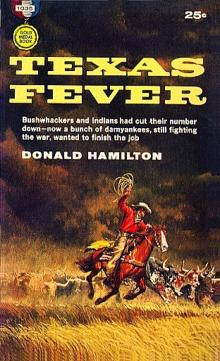 Texas Fever
Texas Fever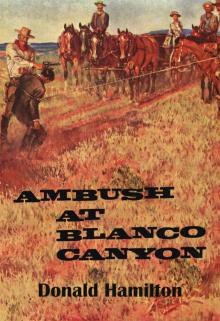 Ambush at Blanco Canyon
Ambush at Blanco Canyon The Big Country
The Big Country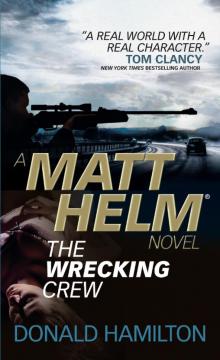 The Wrecking Crew
The Wrecking Crew The Devastators mh-9
The Devastators mh-9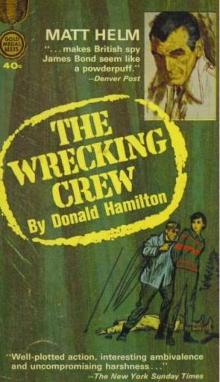 The Wrecking Crew mh-2
The Wrecking Crew mh-2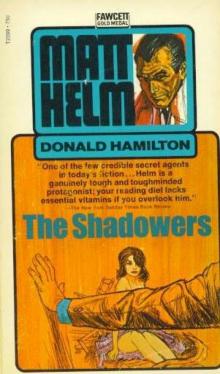 The Shadowers mh-7
The Shadowers mh-7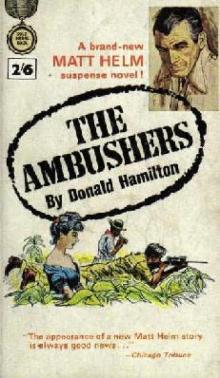 The Ambushers mh-6
The Ambushers mh-6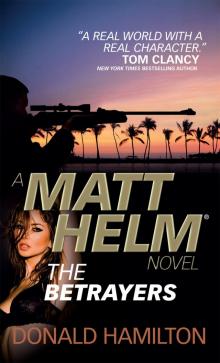 The Betrayers
The Betrayers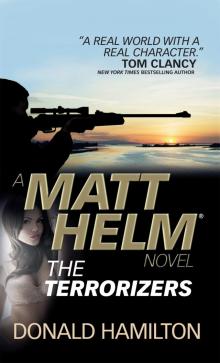 The Terrorizers
The Terrorizers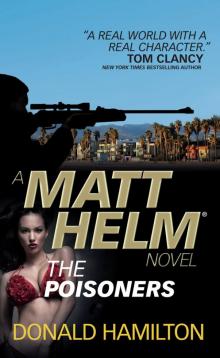 The Poisoners
The Poisoners The Devastators
The Devastators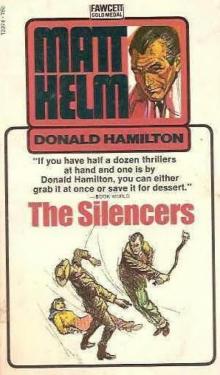 The Silencers mh-5
The Silencers mh-5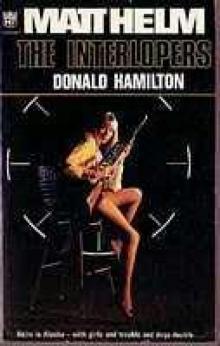 The Interlopers mh-12
The Interlopers mh-12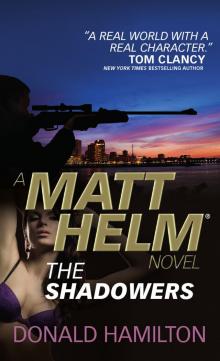 The Shadowers
The Shadowers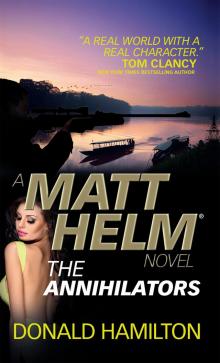 The Annihilators
The Annihilators The Vanishers
The Vanishers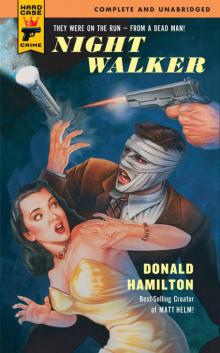 Night Walker
Night Walker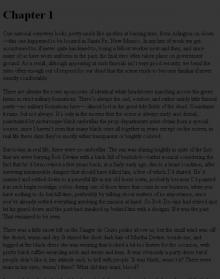 The Revengers
The Revengers The Frighteners
The Frighteners The Infiltrators
The Infiltrators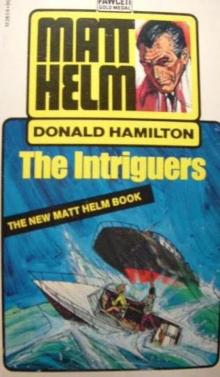 The Intriguers mh-14
The Intriguers mh-14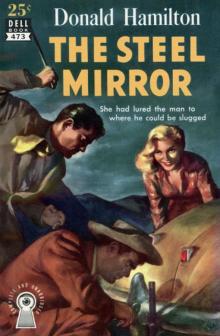 The Steel Mirror
The Steel Mirror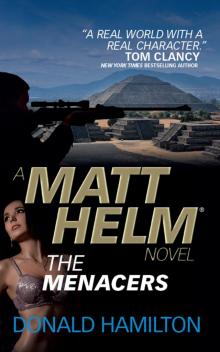 The Menacers
The Menacers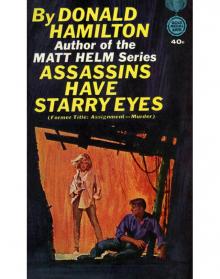 Assassins Have Starry Eyes
Assassins Have Starry Eyes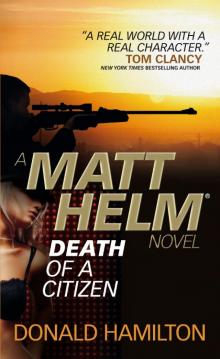 Death of a Citizen
Death of a Citizen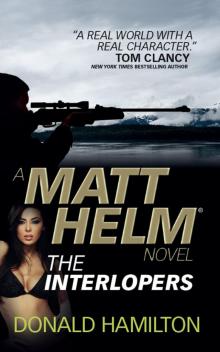 Matt Helm--The Interlopers
Matt Helm--The Interlopers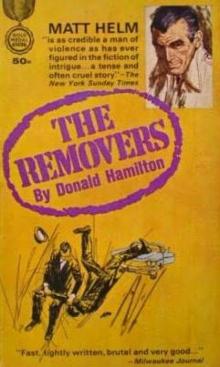 The Removers mh-3
The Removers mh-3 The Demolishers
The Demolishers Murder Twice Told
Murder Twice Told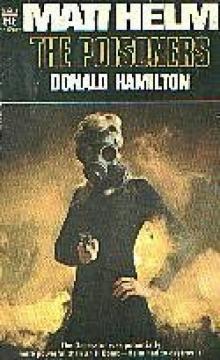 The Poisoners mh-13
The Poisoners mh-13 The Ambushers
The Ambushers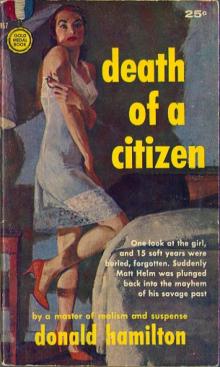 Death of a Citizen mh-1
Death of a Citizen mh-1 The Silencers
The Silencers The Removers
The Removers The Intimidators
The Intimidators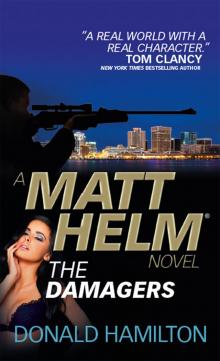 The Damagers
The Damagers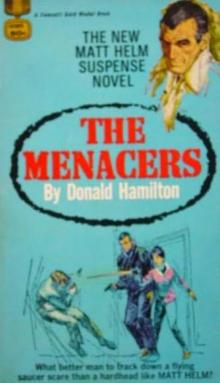 The Menacers mh-11
The Menacers mh-11 The Retaliators
The Retaliators Murderers' Row
Murderers' Row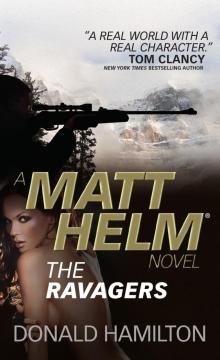 The Ravagers
The Ravagers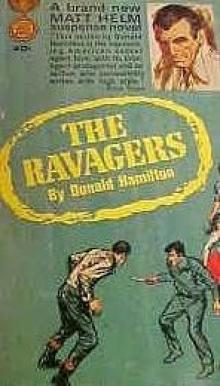 The Ravagers mh-8
The Ravagers mh-8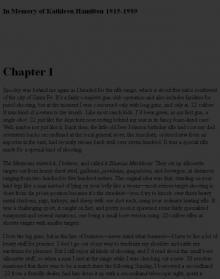 The Threateners
The Threateners The Betrayers mh-10
The Betrayers mh-10